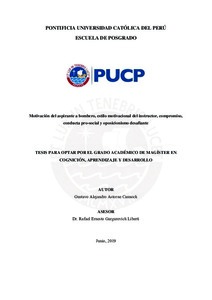| dc.contributor.advisor | Gargurevich Liberti, Rafael Ernesto | |
| dc.contributor.author | Astorne Cannock, Gustavo Alejandro | es_ES |
| dc.date.accessioned | 2019-09-24T21:07:01Z | es_ES |
| dc.date.available | 2019-09-24T21:07:01Z | |
| dc.date.available | 2019-09-24T21:07:01Z | es_ES |
| dc.date.created | 2019 | es_ES |
| dc.date.issued | 2019-09-24 | es_ES |
| dc.identifier.uri | http://hdl.handle.net/20.500.12404/15042 | |
| dc.description.abstract | Tomando como marco teórico la Teoría de la Autodeterminación (TAD) (Ryan y Deci,
2000, 2017), se investigó si las relaciones entre la percepción que el aspirante a bombero posee
con respecto al estilo motivacional del instructor (de apoyo a la autonomía o control), el
compromiso con su labor (vigor, dedicación y absorción), la conducta pro-social y el
oposicionismo desafiante, estaban mediadas por la motivación (autónoma o controlada) en un
grupo de 224 aspirantes a bombero(a) de la ciudad de Lima. Los resultados iniciales mostraron
correlaciones significativas entre la percepción orientada al estilo motivacional del instructor y
el tipo de motivación de los (las) aspirantes a bombero(a) con las variables compromiso y
oposicionismo desafiante, pero no se encontraron correlaciones significativas con la conducta
pro-social ni tampoco entre las variables de percepción del estilo del instructor y el tipo de
motivación de los (las) aspirantes. Por ello, el modelo inicial fue modificado y se estimó un
modelo de efectos directos. Los resultados del análisis de senderos mostraron efectos positivos
entre la percepción del estilo motivacional del instructor de apoyo a la autonomía y la
motivación autónoma de los aspirantes así como con el compromiso, y además mostraron
efectos negativos con el oposicionismo desafiante. También, se encontraron efectos positivos
entre la percepción del estilo motivacional de control del instructor y motivación controlada
con oposicionismo desafiante. Los resultados concuerdan con las investigaciones llevadas a
cabo sobre del bright side y el dark side utilizando la TAD (Ryan y Deci, 2017). Resulta
importante tomar estos resultados en cuenta para los bomberos voluntarios ya que hay pocas
investigaciones sobre aspirantes a bomberos y en este contexto el tipo de motivación genera un
mayor compromiso con la labor del bombero y el rol del instructor que no promueve la
autonomía puede generar conductas de oposicionismo desafiante. | es_ES |
| dc.description.abstract | Using Self-determination Theory as a framework (Ryan y Deci, 2000, 2017), the
present study explored if the quality of motivation of the firefighter candidates (autonomous or
controlled) mediated the relationship between the perception of the instructor's motivational
style (autonomy support or control) and the variables of engagement (vigor, dedication and
absorption), pro-social behavior and oppositional defiance, in a group of 224 firefighter
candidates from the city of Lima. The initial results find significant correlations between the
instructor's motivational style and the type of motivation of the firefighter candidates with the
variables of engagement and oppositional defiance, but no correlation was found with prosocial
behavior neither between the instructor's motivational style and the type of motivation.
Given these results, the mediation model was replaced by a direct-effects model. The path
analysis results found positive effects of instructor's autonomy supportive style on autonomy
and autonomous motivation on the variables of engagement, as well as negative effects on
oppositional defiance. Also, the perception of the instructor's controlling style and controlled
motivation were together found to have a positive effect on oppositional defiance. The results
are consistent with both the bright side and the dark side of the theory of motivation (Ryan y
Deci, 2017). It is important for volunteer firefighters to take in consideration these results since
there is little research on firefighters in training, also in this context the type of motivation
generates a greater engagement to the work of the fireman, and the role of the instructor who
does not promote autonomy would generate behaviors of oppositional defiance. | es_ES |
| dc.language.iso | spa | es_ES |
| dc.publisher | Pontificia Universidad Católica del Perú | es_ES |
| dc.rights | Atribución-CompartirIgual 2.5 Perú | * |
| dc.rights | info:eu-repo/semantics/openAccess | es_ES |
| dc.rights.uri | http://creativecommons.org/licenses/by-sa/2.5/pe/ | * |
| dc.subject | Bomberos--Perú--Lima | es_ES |
| dc.subject | Motivación (Psicología) | es_ES |
| dc.title | Motivación del aspirante a bombero, estilo motivacional del instructor, compromiso, conducta pro-social y oposicionismo desafiante | es_ES |
| dc.type | info:eu-repo/semantics/masterThesis | es_ES |
| thesis.degree.name | Magíster en Cognición, Aprendizaje y Desarrollo | es_ES |
| thesis.degree.level | Maestría | es_ES |
| thesis.degree.grantor | Pontificia Universidad Católica del Perú. Escuela de Posgrado | es_ES |
| thesis.degree.discipline | Cognición, Aprendizaje y Desarrollo | es_ES |
| renati.discipline | 199237 | es_ES |
| renati.level | https://purl.org/pe-repo/renati/level#maestro | es_ES |
| renati.type | http://purl.org/pe-repo/renati/type#tesis | es_ES |
| dc.publisher.country | PE | es_ES |
| dc.subject.ocde | https://purl.org/pe-repo/ocde/ford#5.01.00 | es_ES |






